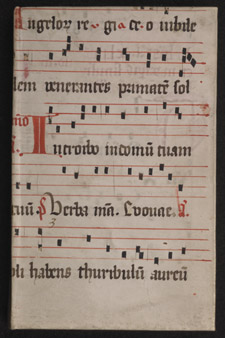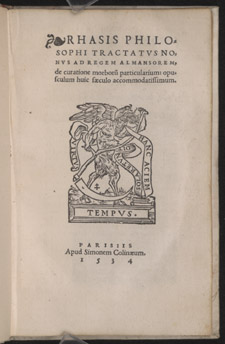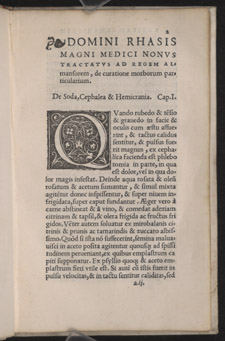Abu Bakr Muhammad ibn Zakariya Razi (865?-925?)
Rhasis philosophi tractatus nonus ad regem Almansorem, de curatione morborum particularium…. Parisiis: Apud Simonem Colinaeum, 1534.

- Abu Bakr Muhammad ibn Zakariya Razi, Rhasis philosophi tractatus nonus ad regem Almansorem…. Front Cover. This binding, covered with musical notes and made from an old manuscript, was probably added in the 20th century.

- Abu Bakr Muhammad ibn Zakariya Razi, Rhasis philosophi tractatus nonus ad regem Almansorem…. This is volume nine, Therapeutics, the most widely read. Other volumes cover physiology, dietetics, rules of health, surgery, poisons, and fevers. The initial and ornament to the left of the title closely resemble that of our 1537 Galen. Both books were printed in Paris.

- Abu Bakr Muhammad ibn Zakariya Razi, Rhasis philosophi tractatus nonus ad regem Almansorem…. Note the delicate decorative design of the initial.
The Almansor is a medical encyclopedia in ten volumes, written by the Islamic doctor and scholar Abu Bakr Muhammad ibn Zakariya Razi (Rhasis), who, along with Galen and Hippocrates, ranks as a founder of clinical medicine. He was born near Tehran and during his career directed hospitals both in Tehran and Baghdad. A follower of the teachings of Galen, Razi questioned those ideas that contradicted his experience. Although he was a noted clinician, his great contribution came as a compiler of medical information: his encyclopedia brought together the work of diverse authors and provided the results of many clinical experiments. Razi’s writings, which included the first descriptions of smallpox and measles, also added to the understanding of ophthalmology and obstetrics. His work was studied in Arabic and Greek editions before being translated into Latin in the fifteenth century.
next author: Avicenna (980-1037).